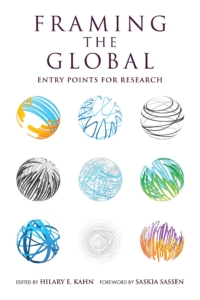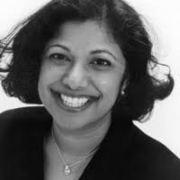The field of Global Studies has a similar historical trajectory as the field of comparative education. Both fields in the American context were formalized in the 1950s during the Cold War and expanded in the 1980s when scholars “began to take note of the rapidly increasing transnational flows of people, ideas, and products, and the social, political, economic, and cultural consequences of these trends.” Both also lack a clear disciplinary home. Scholars bring myriad academic perspectives to each field, from economics to sociology and from history to anthropology.
So today we explore global studies in depth in an effort for mutual learning.
With me today is a leading scholar of global studies, Hilary Kahn. Hilary Kahn is the assistant dean for international education and global initiatives and director of the Center for the Study of Global Change in the School of Global and International Studies at Indiana University. She is a co-director of the Framing the Global project, which is trying to “develop and disseminate new knowledge, approaches, and methods in the field of global research.” She co-edited a book entitled Framing the Global: Entry points for research that I think could be valuable to comparative education researchers.
Citation: Kahn, Hillary, interview with Will Brehm, FreshEd, 65, podcast audio, March 20, 2017. https://www.freshedpodcast.com/hilarykahn/
Transcript, translation, and resources:
Will Brehm 1:43
Hilary Khan, welcome to FreshEd.
Hilary Kahn 1:45
It’s great to be here. Thanks.
Will Brehm 1:48
So what is Global Studies?
Hilary Kahn 1:51
Global Studies is a field of knowledge production that is getting more and more attention. It started around the mid-20th century after the dawn of World War II, particularly actually after Sputnik, when there was an increasing recognition that the US really needed more understanding of the world. That it particularly needed more deep area expertise and language abilities, and it had a real emphasis on security and maintaining the prominence of the United States, after the horrors of World War II. That was the burgeoning of not just Global Studies, but actually international education writ large. And at this point in time, in the 40s into the 50s, I think the particular emphasis was also about supporting development in a very traditional sense of the word development, sort of development in third world in order to avoid these sort of bastions of unrest and potential and communism.
So this is what really led to what we now know as “Area Studies”, and where there was an increasing amount of funding and interest in the scholarly community to support deep training in particular areas of the world. Area studies – deep understanding of the languages, the history, the politics, the economics, the cultures, you name it. And in a very somewhat bounded way; that these particular regions… that you could have specialists that focused on these regions without actually a understanding of the broader connections to other regions, or to the world and so on. So, lo and behold, bit by bit, the world became more interconnected, the world became… economics obviously became more visibly interconnected, and Global Studies, the sort of focus emerged in the 1980s. And this was just really at the same time where not just scholars and not just academics, but generally the world and various different practitioners were really beginning to recognize this incredible global flow, this high pace speed, this sort of intensity of these flows of things, and of communities, and of people, and knowledge, and that was the beginning of Global Studies. Now, you asked what it is, and actually, if you if you must know, I’ve very rarely been asked that particular question so pinpointed, “What is Global Studies?” Because it is not an easy answer. And I actually don’t necessarily have the easy answer. To me what Global Studies is depends on the person who’s asking that question. It depends on the researcher who has a particular question that they’re trying to understand; it’s based on the position of the researcher, whether you’re coming from a particular discipline or interdisciplinary perspective; it depends on the region that you’re that you’re seeking that knowledge from. Ultimately, though, it is about understanding the world relationally. It’s about understanding connections, but it’s also about understanding what is being connected.
Will Brehm 5:46
Now is Global Studies similar to International Relations? I know that’s another discipline in the academic field. And I just always wonder… there must be overlaps, but somehow, differences as well?
Hillary Kahn 6:03
For sure. And I also have to clarify that the type of Global Studies I propose, and that I think we do at The Center for the Study of Global Change at Indiana University may not be the type of Global Studies that you’ll find everywhere else, or anywhere else. It’s a growing area of Global Studies – we’ll talk more about this approach of “grounded Global Studies”, but not every university would sort of claim that this is how they think about Global Studies. The IR was much more prominent in the field of Global Studies at the beginning. So this first phase of Global Studies in the 1980s and into the 1990s is where Economics and Political Science and International Relations really dominated. And this was also the same time where many of the scholars were focusing on globalization as this singular omnipresent entity that was inevitable, and that also saw cultures and states and people around the world is sort of victims to globalization. With that said, many scholars and others saw that globalization was also nothing new at all. So there was sort of these two camps that was either this sort of like omnipresent, dominant, hegemonic force, or it was just like the same old thing. So things changed in the 1990s for Global Studies, and that’s really where a lot of the academic programs emerged and scholarly journals emerged, and the disciplinary focus really widened. As far as IR goes, the big difference is that the main frame of reference for International Relations remains the nation; it remains the state. And I think Global Studies works really, really hard to not be defined by a particular frame of reference, or a particular analytic lens. And that’s exactly in many ways what International Relations does, so I would say that’s the biggest focus or the biggest change. The other thing that International Relations does – although it focuses on relations, it doesn’t really focus on relations as much as you would think. It often falls back on a comparative approach, or the relations are so multi… no, they’re so singular in the sense that they are really stripped down to the sort of very basic political policy oriented relations, and then they often lose track, actually, of what is being connected. So the global tends to focus on those relational, the in-between, but also where those policies, those ideas, those new approaches are being anchored. And that’s one of the bigger differences I would say.
Will Brehm 9:28
And and so your Center takes what you said earlier, the grounded Global Studies approach. Can you explain what that is, and what sort of academic disciplines are you drawing on to think about a “grounded” approach to Global Studies?
Hillary Kahn 9:48
I don’t want to take credit for this, this is not that new. Because again, in the 1990s, the switch from the IR approach and the economic approach to globalization and Global Studies really started to occur, and that’s when disciplines such as Anthropology, Sociology, Geography, and I think those three in many ways were, and have still been, three of the disciplines that have had the greatest impact on this new field of Global Studies. Others along the way have really become more integrated, including many new humanities based disciplines, and so on. But it was the influence of these particular three disciplines, I think, that started Global Studies to think more about assemblages and networks, and to focus also at the same time of how the global was actually given meaning in particular communities and politics and people and in lives, right? So that it wasn’t just this omnipresent, dominating entity that was turning these people into victims, but that people and places and communities and particular cultures were actually given meaning, and also it was a relationship between globalization and the various different peoples and places that were giving it meaning.
So when I when I talk about a grounded Global Studies, this is in many ways the approach that we have at the framing The Global Project, and we’re also beginning to publish a lot of this work in our framing of the Global Research series with Indiana University Press. But for many ways when I talk about grounded Global Studies, I talk about it being, well, empirically based for one thing. When I say empirically based, I mean all research is supposed to be empirically based, but there is not one “global”, and we can talk a little bit about that too. There are multiple “globals”, and you need to be allowing your particular data, your research, your material, the narratives, whatever that data is – whether it’s quantitative or qualitative – you need that to be driving your approach to Global Studies. There’s not going to be one methodological tool box that you can pull for Global Studies. It’s not yet – I’m saying, “not yet” – it’s not yet a discipline, right? And I actually don’t know if it ever will be. It’s a field for sure. Maybe it will be a discipline, maybe this is where Global Studies is going in the future. But at this point it’s going to be signified in different ways in specific places. So when you talk about grounded, it’s this understanding that you’re talking about transnational boundaries, transnational phenomena that transcend boundaries, but that is truly given significance within specific spaces, and that you need to enter into that space from, from whatever is driving your research.
Will Brehm 13:36
So what would be an example of a transnational phenomena that has specific meaning in a certain space?
Hillary Kahn 13:44
I’m going to answer this by not answering it, but I’m going to answer it by by talking a bit about where I became a global scholar. And I say that because I’m an anthropologist. Anthropologists are sort of bred to be not global thinkers. We’re bred to be very globally oriented. We do our field work in particular communities, the more remote the better. A lot of these binaries still exist, actually, although Anthropology, as I also said, has gone more global and has really contributed to the field of Global Studies, in some ways, more than any other discipline, or maybe Geography, again, Geography, Sociology, and Anthropology. But when I first was an anthropologist, I would not think globally. One of the things you need to do to think globally, is, you need to be able to think universally. So you need to be able to think about broad trends that are happening across space, in a very universal way. And anthropologists are trained to think very relatively, you know, about particular contexts, about difference, about these unique spaces, and not necessarily to think in a broadly way. In fact, in some ways, “universality” is sort of taboo in Anthropology, right. But to think globally, you need, literally, to be able to do both. You need to be able to think very universally about these broad issues, and also about the significant, the idiosyncratic locations where broader trends are given meaning. So you need to be really thinking about the general and the particular. Now, I am getting to your question, because one of the universalities that are often proposed that I think is a really good topic to discuss in the classroom is human rights. So you have these basic human rights; they’ve been created by different conventions that are supposed to be a collective endeavor. They’re supposed to be indivisible, they are for all humans, and, and they apply across the board. So that would be… This is probably not the best example, but I’m going to say it anyways. But human rights as a construct, as an anthropologist, we were always very skeptical of human rights. Like, how could you have something that’s universal? There’s no such thing. And it’s even called the declaration, right? It’s the Universal Declaration of Human Rights. And anthropologists have always dealt with human rights in a very very different way. And instead, it’s not that we are against human rights, or that Global Studies, you know, grounded Global Studies is against human rights, it totally believes in human rights, but it also recognizes that these broad phenomenon, these policies, these universal declarations need to be understood within the particular context, and the communities, and the people that are living out these rights. And so, in many ways, I guess that would be one example. I think I went round and round to answer a very simple question. Other examples of transnational trends, you can pick your global issue, choose it – migration, immigration, communications, democracy. None of those have those have meaning unless they’re played out in specific locations. And I don’t mean necessarily specific locations in a traditional community sense, but in organizations or maybe in art worlds, or in transnational diasporic identities. So you determine what space you’re going to explore it through, and you ground it. Again, it doesn’t have to be grounded on the ground in a community like an anthropological sense or traditionally ethnographic sense. (I’m talking traditionally because ethnographers have definitely challenged that boundary now.) But again, choose your global issue, and to me, you want to look at it from as general perspective as you can. So understand it as a transnational phenomenon, or flow or policy or some kind of connection, but also you need to understand where it interconnects with the intimacies of our lives.
Will Brehm 19:15
And one of the examples that you do write about in one of your pieces that I’ve recently read is about a cup of coffee. How you can actually look at this simple, daily occurrence that people buy coffee, drink it, and maybe never think about it, but you kind of turn that. So you can actually look and dig deeper, and uncover a lot of these transnational issues that are affecting people.
Hillary Kahn 19:41
Yes, I love coffee. I actually do love coffee! And to get to students, particularly, I think this is where I’m really talking about the, the cup of coffee. But it’s the same thing when you’re doing global scholarship – you need your entry point. And so my entry points for students often are these simple items that are so apparently neutral that you don’t even truly understand how they are, in many ways, lightning rods for these global connections, for all these global phenomenon that I speak of. Everybody drinks coffee; there’s some hundred million people drink coffee every day. My cup here doesn’t have coffee in it; it has water in it, because it’s a little late. But what we don’t see when we’re drinking our coffee is the whole life of coffee and how it has a has a global face. So what we don’t see are the, you know, the, the little children on the mountain size of Costa Rica and Guatemala or Ethiopia or Indonesia that are sort of picking these beans and selling them to, to the middle man or the middle person who then sells them to the exporters and the processors and basically how they end up in our Starbucks or in our coffee cups every morning. And if you can take that cup of coffee and dissect that for your students to sort of just peel it back bit by bit by bit by bit, you can show them the global. It’s right there. And you can show them all the inequalities, and there’s a lot of inequality in the global. And it’s certainly not flat. You can demonstrate that this coffee is a very very complicated, messy, disjointed representation of the globe, and what you can do is you can demonstrate how the global occurs across many scales, and to to make meaning for your students though, you need to bring it down to something that is in their own backyard, whether it’s a cup of coffee – and I’ve used coffee or roses or iPhones or sugar’s a great one. Just take something and begin to demonstrate the complexity and how everything is truly interfaces with the Global in some way. And I say “the Global” with the understanding that there really is not one “Global”, but multiple “Globals”.
Will Brehm 22:42
Can you tell us a little bit more about what that means to have multiple Globals?
Hillary Kahn 22:46
Yes. So we have an edited volume called “Framing the Global”, and I actually really wanted to call it “Framing the Globals”, but my publisher did not want anything to do with that. And I think it’s good; I’m glad that we didn’t go that route, but I was really fighting for it for a while because a grounded form of Global Studies does not seek one Global, it recognizes that there are a ton of different ways to frame your Global; there’s not a singular Global. Just like there’s no one question that we’re all asking. So we’re all asking different questions; we’re entering it from different disciplines; we’re asking it about particular areas of the world. I mean, what is Global in a in a in a truly big G way is given meaning in small g ways by people and by the interaction and by the sort of complexity of where globalization is actually playing out. And so I often talk about big g Globals. I don’t know what a good example of that is – I guess pick your global issue; people have talked about that big D Development, little d development or big N Neoliberalism and little n neoliberalisms. In fact to think about the global in a singular way is just not helpful or in only a universal way…. it goes back to the 1980s earlier phase of global studies where it is seen as a sort of monolithic, penetrating force when in fact it’s not. It is given meaning in a variety different context. Now interestingly, pop culture still sees it as this omnipresent, dominant, hegemonic force. Not all, but that perspective, that understanding of globalization that everybody’s a victim of globalization still occurs. We won’t get into that here, about the winners and the losers of globalization because that’s increasingly something that is driving our politics and our lives because there certainly is. Again, it’s not a level playing field and I’ll leave it at that.
Will Brehm 25:28
It seems like the idea of having Globals and having every person in every situated experience kind of constructs these Globals. (It seems like it’s very different than this Global/Local dichotomy that often we hear about or read about in academic literature. And it seems like it’s going away from that sort of dichotomous thinking.
Hillary Kahn 25:54
Yes, I hate dichotomies and I hate binaries, but they’re really, really hard to get out of. And no matter what we do, we often end up thinking about the world in juxtapositions even as hard as we try not to. But what happens when we do that, when we think in these dichotomies, is I think we efface and we hide up we conceal so much of that interdependence and interconnections and interrelatedness of the world. It simplifies things in often, I think, in a harmful way. Again, it’s best to, I would say, create our categories and not our binaries, just generally create our sort of our cartographies of scholarship based on what we’re reading, what we’re seeing, what we’re exploring, rather than based on the way it’s always been done. And that’s really what binaries often do. They’re too rigid, they’re too constraining, but boy, they’re entrenched and so it’s very, very hard even me. A lot of times when I talk about global/local because I fall back on it too, even though I try really, really hard not to. It just depends on the context of who I’m speaking to. But how how do you explain that? It’s very difficult. One of my goals is to find a better term. People use Glocal and so on. I don’t like that either but there’s a good reason for that because that’s really what it is. They’re seemless. Just like you can’t create a division between them. Just like walls don’t separate the national from the international. This is very porous and so on. But dichotomies… I often try to sit on my hands what I talk about the global/local because I often raise my hand when I’m talking about the Global and then I lower them what I’m talking about the Local, and I I literally find myself doing that all the time. And most people do. But no, the whole point of Global Studies, grounded Global Studies is that in fact the Global is everywhere and the Local is also giving meeting to the Global, so but all these kinds of binaries I hate in my field actually: global/local, area studies/global studies, scholarship/practice, social science and the humanities, teaching and research. These are all binaries that drive me a little batty but until I find ones to replace them… I tend to have a messier approach to the world.
Will Brehm 28:51
The approach that you take, you use this word “entry points”. Is this a way you kind of conceptualize and think about Globals in order to not have that binary thinking?
Hillary Kahn 29:05
Yes, it is in many ways and that’s something that we we talked about specifically in the Framing the Global edited volume, and again because Globals can be found pretty much anywhere and there’s not a methodological tool box or disciplinary paradigm or one particular entry point that every scholar can explore the Global. Because of the multiplicity, the plurality of Globals, what we’re really doing is we need not designate particular entry points to understanding the world, but in fact, it depends really on the questions you’re asking, the spaces in which you’re asking them, your disciplinary context. In the book, we basically decided that there was not going to be a defined approach, or there wasn’t going to be one definition of Global. Let me just tell you take this back to talk about Framing the Global. Framing the Global project was a grant supported by the Mellon Foundation project that was a research and publications project and we brought together 15 scholars, top notch globally oriented scholars to help us redefine the field of Global Studies. And one of the first things we tried to do in Framing the Global project was create a glossary for Global Studies. And so, we had terms like, we had a wiki and we were all contributing to it, and we had Transnational and Global and eventually we just decided it was not going to work because we couldn’t at all come to grips. We were all approaching from different ways, we were all thinking about it from our disciplinary context on the work that we were doing – whether we were humanities based or social scientific, or whether we were more qualitative or quantitative – and so ultimately, we decided that that the one thing that we could do together as a group, as a Framing the Global, as a new way of thinking about Global Studies was suggest these entry points. That in fact, what we need to do solid Global Studies work and to be empirically-based Global Studies work is to think about Global Studies research as entry points, which basically brought down the abstraction of the Global. It brought it down to a point where it had more substance to it in some ways. And it undid those types of binaries, so it got us out of thinking about not only binaries did it get us out of it, but it got us out of any traditional category. One of the things I think you’re trying to do in Global Studies, and actually in any interdisciplinary field, is bust a category here and there. And so, you you need to sort of rethink what is a discipline, rethink what is your research toolbox, and entry points really allow you to conceptualize the Global based on your particular empirical-based questions and research concerns.
Will Brehm 32:46
So what sort of entry points do you use in your own work?
Hillary Kahn 32:50
Well, I would say coffee was an entry point for me, as far as going back to the classroom. But coffee is an entry point. I also use identity a lot in my own research; I don’t do as much research as I once did, but back in the days when I did more research, my entry point, for example, when I worked in Livingston, Guatemala with the group of Q’eqchi’ Mayan community, I actually did a visual ethnographic project with them. But what I was really looking at was their worldview, their identity, their sense of self, and how through that, if you sort of really explored how they saw themselves vis-a-vis others and vis-a-vis authority figures, and sort of a sense of the foreign, that you can get a sense of, you can understand how the Global was embedded in their sense of itself. And when I talk about the Global, I’m talking about their understanding of historical Guatemalan politics and civil wars and US relations and conquistadors from Spain, and all these different authority figures that are truly, truly global, were sort of embedded in a world view of the Q’eqchi’ Maya. So in many ways, I would say, for my work in Guatemala, it was identity, or it was a worldview. It was a reflection on oneself that was my entry point to understanding the Global.
Will Brehm 34:45
And what do you think the future of Global Studies is going to be? Do you think it’s going to be a discipline, or would you see it going in other directions?
Hillary Kahn 34:57
One thing I would like to see for the field of Global Studies is that it becomes a place where our students can get jobs in traditional disciplines. That’s always been one of the issues of Global Studies is that you have this interdisciplinary amazing breadth of knowledge and you have multiple tool sets, and you’ve doubled a different disciplines, but are you going to get hired in a Political Science department? Or you’re going to get hired in an Anthropology department? Not today. Not yet. And so one thing I would like to think is that ideally, we might become a field or an emerging discipline that in fact would allow our scholars to be hired in traditional disciplines. That traditional disciplines begin to see the benefits of having that breadth of knowledge. And that traditional disciplines don’t see it as detracting from their own disciplinary perspectives, but in fact strengthening it and complementing it and enhancing it. I think the other area that perhaps is that Global Studies that this might already be happening in Global Studies, it’s certainly happening in Global Learning – is that the field becomes increasingly more than just knowledge, but it becomes a field that is about what you do with that knowledge. So an increasing sense of application, perhaps issues of social justice, there might be more issues of ethics built into this. So it’s not just about knowledge, and it’s not just about sort of discursive discussions about knowledge, but in fact, it’s about taking that knowledge and applying it and having an impact.
Will Brehm 36:58
So overcoming that theory/practice dichotomy.
Hillary Kahn 37:01
There you go. Exactly! Let’s bust some more categories.
Will Brehm 37:09
Well, Hillary Khan, thank you so much for joining FreshEd today. It was really wonderful to talk.
Hillary Kahn 37:54
My pleasure. It was a real delight. Thank you for hosting me.
Want to help translate this show? Please contact info@freshedpodcast.com
Framing the Global with Global Studies











